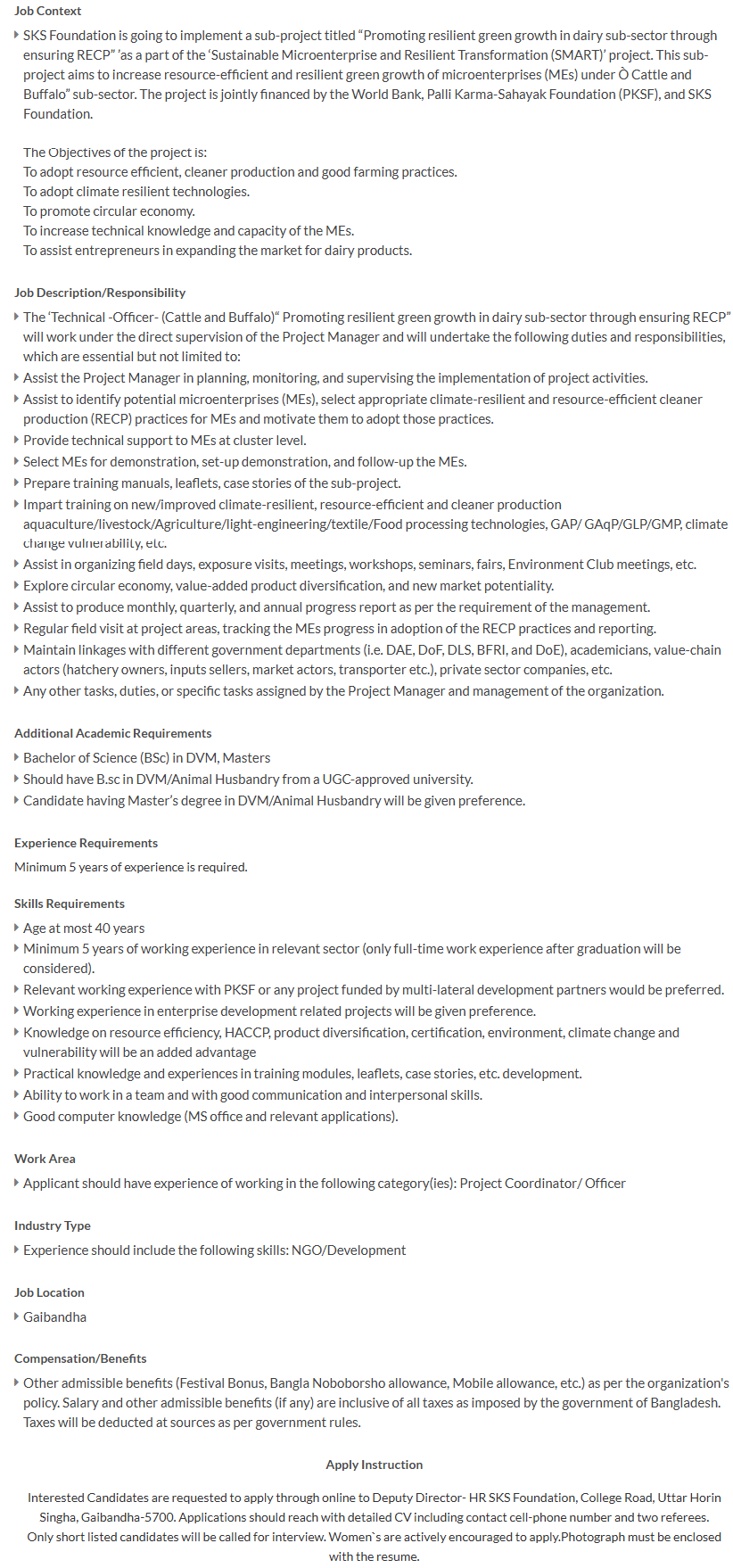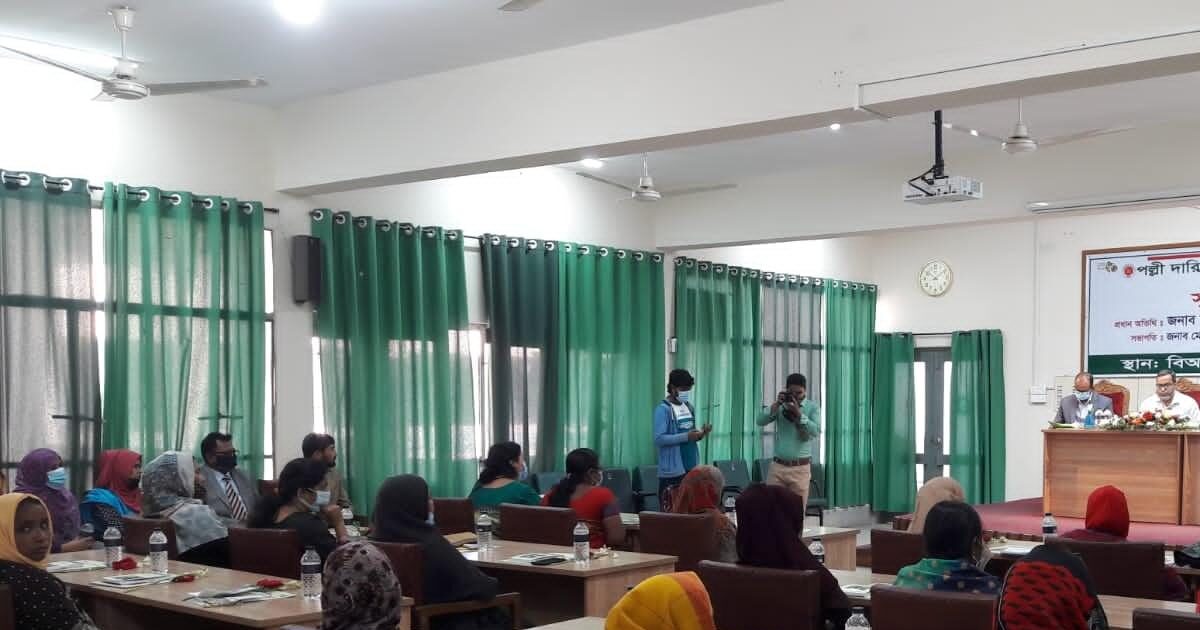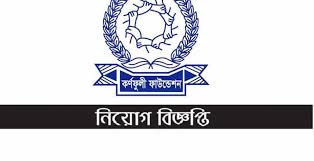SKS Foundation
- Job Category: NGO/Development
- Job Source: nrbjobs.com
- Job Location: Gaibandha
- Employment Type: Full Time
- Gender: Any
- Experience: Minimum 5 years
- Career Level: Mid Level
- Posted On: 19 Apr 2025
- Application Deadline: 30 Apr 2025

Apply
SKS Foundation: A Beacon of Community Empowerment and Sustainable Development
Introduction
In the heart of Bangladesh, where rural communities face persistent challenges such as poverty, illiteracy, limited access to healthcare, and vulnerability to climate change, non-governmental organizations (NGOs) play a crucial role in fostering sustainable development. Among the many organizations working to uplift marginalized communities, SKS Foundation stands out as a visionary institution deeply rooted in local realities and dedicated to transforming lives.
Established with the mission of improving socio-economic conditions and ensuring human dignity, SKS Foundation has evolved into a prominent development organization in Bangladesh. Through innovative programs in education, health, microfinance, disaster risk reduction, water and sanitation, and women’s empowerment, SKS Foundation serves as a catalyst for grassroots development. This write-up explores the journey, structure, activities, achievements, and future outlook of SKS Foundation in a comprehensive manner.
Historical Background
The SKS Foundation was born out of a humanitarian vision during the early 1980s, a time when Bangladesh was grappling with post-independence poverty, infrastructural challenges, and frequent natural disasters. Recognizing the critical need for community-based solutions, a group of social activists established SKS Foundation in 1987 in Gaibandha district, one of the most disaster-prone areas in the northern region of Bangladesh.
Founding Principles
- Social justice and equity**
- Empowerment of the poor and marginalized**
- Community participation in development**
- Sustainability and accountability**
The foundation initially focused on relief and rehabilitation work for flood victims. However, over time, its mission expanded to include holistic development through integrated programs aimed at education, health, agriculture, microfinance, and infrastructure development.
Vision, Mission, and Core Values
Vision
To build a just, equitable, and sustainable society where every individual enjoys the right to live in dignity and peace.
Mission
To empower the poor and disadvantaged people—especially women and children—by ensuring their participation in development processes and helping them access their rights, opportunities, and services for a better life.
Core Values
- People-centered approach
- Accountability and transparency
- Gender equity and social inclusion
- Innovation and learning
- Collaboration and partnership
Governance and Organizational Structure
SKS Foundation is registered with multiple regulatory bodies, including:
- NGO Affairs Bureau
- Directorate of Social Services
- Microcredit Regulatory Authority (MRA) Governance
SKS Foundation is governed by a General Body and a Governing Body:
- The General Body comprises founding members, development professionals, and social workers who meet annually to review organizational progress.
- The Governing Body (elected from the General Body) provides strategic direction and policy oversight. Executive Leadership
The Executive Director (ED) is the chief executive responsible for implementing programs, managing human resources, fundraising, and maintaining external relations. The ED is supported by department heads, regional managers, and project coordinators.
Departments
- Microfinance and Financial Inclusion
- Education and Child Protection
- Health and Nutrition
- Water, Sanitation, and Hygiene (WASH)
- Disaster Risk Reduction and Climate Change
- Women’s Empowerment and Livelihood
- Monitoring, Evaluation, Accountability and Learning (MEAL)
Program Areas and Initiatives
SKS Foundation operates a wide range of integrated development programs targeting multiple dimensions of poverty and marginalization.
- Microfinance and Livelihood Development
Microfinance is one of the flagship components of SKS Foundation. It offers financial services to the rural poor, especially women, to help them generate income and escape poverty.
Key Features:
- Group-based lending** methodology.
- Savings services** to build financial resilience.
- Skill training and enterprise development**.
- Agricultural loans**, *SME loans*, and **housing loans.
- Linkages with value chains and markets.
By 2023, SKS Foundation had mobilized over 100,000 members under its microfinance program, creating significant impact in income generation and women’s economic empowerment.
- Education and Child Protection
Recognizing the link between education and long-term development, SKS Foundation runs inclusive education and child protection programs.
Initiatives:
- Non-formal primary education centers** for dropout children.
- Pre-primary schools** in remote areas.
- Child protection committees** at community level.
- Awareness programs** on child marriage and abuse.
In partnership with organizations like UNICEF and Save the Children, SKS has helped thousands of children access education, safe environments, and support services.
- Health, Nutrition, and WASH
SKS Foundation emphasizes preventive and primary healthcare services to improve community well-being.
Programs:
- Community health worker networks.
- Maternal and child health education.
- Growth monitoring and nutritional support for under-five children.
- Safe water and sanitation infrastructure (tube wells, latrines).
- Hygiene behavior change communication.
SKS Foundation’s integrated WASH programs have improved public health conditions, reduced waterborne diseases, and promoted hygiene practices in disaster-prone and hard-to-reach areas.
- Disaster Risk Reduction (DRR) and Climate Resilience
Gaibandha and surrounding districts are vulnerable to floods, river erosion, and climate-induced migration. SKS has positioned itself as a leader in disaster resilience.
Interventions:
- Community-based early warning systems.
- Elevated housing and flood shelters.
- Riverbank protection initiatives.
- Livelihood diversification for climate resilience.
- Climate-smart agriculture promotion.
The foundation’s DRR initiatives have been recognized nationally and internationally for their effectiveness and community ownership.
- Women’s Empowerment and Gender Equality
Gender is a cross-cutting theme in all SKS programs. The foundation focuses on empowering women socially, economically, and politically.
Key Strategies:
- Formation of women’s groups and self-help networks.
- Training in leadership, legal literacy, and life skills.
- Access to microcredit and entrepreneurship support.
- Gender-based violence prevention campaigns.
By empowering women, SKS contributes to overall community development and resilience.
- Youth Development and Skill Building
The foundation invests in youth as agents of change and national development.
- Vocational training and job placement.
- Youth clubs and awareness on social issues.
- ICT training for digital inclusion.
- Sports and cultural events for youth engagement.
These programs are aimed at addressing youth unemployment, substance abuse, and social exclusion.
Geographic Coverage
SKS Foundation operates primarily in northern Bangladesh but has expanded its reach across various districts.
Operational Districts Include:
- Gaibandha
- Kurigram
- Lalmonirhat
- Rangpur
- Nilphamari
- Jamalpur
- Bogura
- Rajshahi
The foundation adapts its program strategies based on local needs and contexts, ensuring relevance and impact.
Partnerships and Collaborations
SKS Foundation has built strong relationships with both national and international partners.
International Partners:
- UNICEF
- Save the Children
- WaterAid
- Oxfam
- Concern Worldwide
- CARE
- European Union
- DFID
- GIZ Government Collaboration:
- Ministry of Primary and Mass Education
- Ministry of Health and Family Welfare
- Local government institutions
Through Public-Private Partnerships (PPPs) and multi-stakeholder platforms, SKS ensures sustainability and scalability of its interventions.
Impact and Achievements
SKS Foundation’s journey over the last three decades has led to significant impacts:
- Over 1 million people** reached through integrated programs.
- Over 100,000 women empowered** through microfinance.
- Thousands of children returned to school through non-formal education.
- Significant reduction in child marriage in project areas.
- Improved sanitation coverage in disaster-prone areas.
- Successful advocacy for land rights and rehabilitation of displaced people.
The foundation has received numerous awards and recognitions for its innovative and inclusive approaches to development.
Challenges and Lessons Learned
Despite its success, SKS Foundation faces several challenges:
- Funding Constraints
- Dependency on donor funding poses sustainability risks.
- Limited resources for long-term investments in infrastructure.
- Climate and Environmental Hazards
- Increasing frequency of floods and erosion disrupts program continuity.
- Need for greater investment in green technologies.
- Operational Challenges
- Staff retention in remote areas.
- Scaling successful pilots to new regions. Lessons Learned:
- Community participation enhances program ownership and success.
- Integrating gender and climate resilience leads to sustainable impact.
- Monitoring and evaluation systems are vital for adaptive learning.
Future Directions
Looking ahead, SKS Foundation is preparing to meet the evolving challenges of the 21st century.
Strategic Priorities:
- Digital Transformation**: Introducing ICT tools in education, health, and finance.
- Climate Action**: Scaling up climate-resilient infrastructure and agriculture.
- Youth and Innovation**: Fostering social entrepreneurship among youth.
- Health Systems Strengthening**: Expanding community clinics and telemedicine.
- Impact Investment**: Exploring social enterprises and blended finance models.
SKS envisions a future where it becomes a center of excellence in rural development, knowledge sharing, and innovation.
Conclusion
The story of SKS Foundation is one of resilience, vision, and dedication. From humble beginnings in a flood-affected district, it has grown into a multifaceted development organization, impacting hundreds of thousands of lives. Rooted in community empowerment and driven by a mission of justice and dignity, SKS Foundation exemplifies how grassroots organizations can transform societies.
In a world where inequality, climate change, and pandemics pose unprecedented challenges, institutions like SKS Foundation offer hope and practical solutions. By continuing its journey with innovation, inclusivity, and integrity, SKS Foundation is poised to be a leader in sustainable development for years to come.
Discover more from Common Target
Subscribe to get the latest posts sent to your email.

